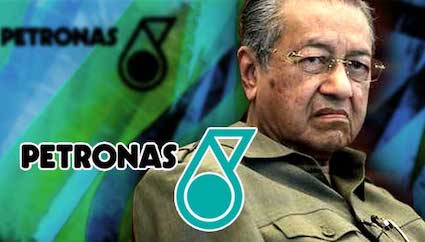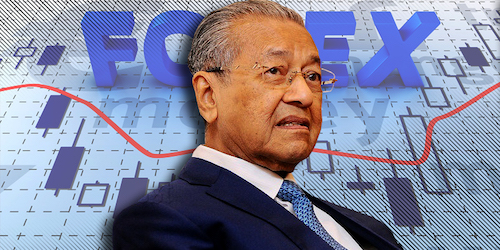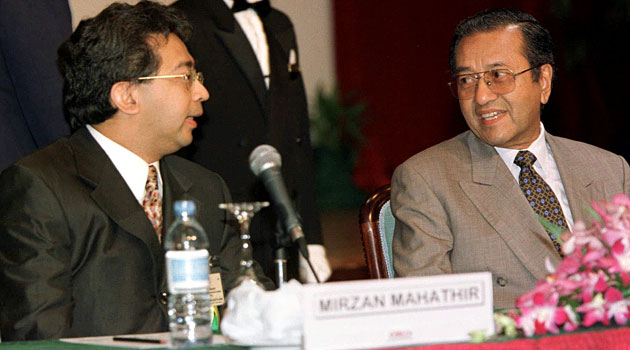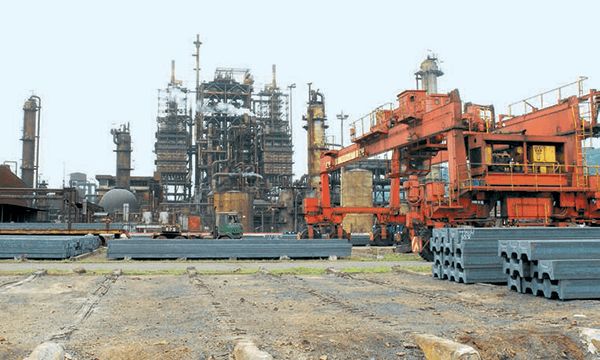
Petronas has provided a convenient cash drawer for successive administrations over the years in cleaning up financial scandals, including Bank Bumiputra, Malaysian Airlines and the Proton national car project and was used to get Malaysia out of an RM31.5 billion forex scandal perpetrated by Mahathir.
By: Murray Hunter, Asia Sentinel
The ability of Malaysia’s national oil company Petronas to continue as a major revenue provider to the national budget is quickly waning, raising the specter of reduced spending, which in turn would mean cancellation of infrastructure works and health and education services, as well as trimming the bloated civil service, as potential nightmare options.
Oil and gas contributions to federal government revenue through petroleum income taxes, dividends and royalties averaged RM53.7 billion (US$12.1 billion at current rates), or 31.6 percent of the total between 2005 and 2015, peaking at 41.3 percent in 2009. This fell to 23 percent in 2019 and is expected to fall much further with both demand and the price of oil dropping below the floor due to the Coronavirus crisis.
In addition, Petronas has provided a convenient cash drawer for successive administrations over the years in cleaning up financial scandals, including Bank Bumiputra, Malaysian Airlines and the Proton national car project. Petronas provided the money to build some of former Prime Minister Mahathir Mohamed’s most grandiose projects, including the KL Twin Towers, the Putra Jaya administrative capital and bring Formula One racing in Malaysia.

Petronas was used to get Malaysia out of an RM31.5 billion forex scandal perpetrated by Mahathir
Petronas was used to get Malaysia out of an RM31.5 billion forex scandal perpetrated by Mahathir in the early 1990s in which the financier George Soros outfoxed Bank Negara, making billions and earning Mahathir’s eternal antagonism. It paid off US$800 million in losses from Mahathir’s ill-fated Perwaja Steel project. In 1998, it bailed out Mahathir’s eldest son Mirzan, purchasing his Konsortium Perkapalan for US$226 million and assuming debts of more than US$324 million. It also awarded in 2012 an RM700 contract to a firm in which Mahathir’s other son Mokhzani was a vice president.
The energy giant, which would become a world player in petroleum markets, was established just after the New Economic Policy (NEP) was crafted in 1971 to enhance bumiputra involvement within the economy. Petronas wrenched control of Malaysian oilfields from Royal Dutch Shell under nationalistic fervor. Through political maneuvering led by the inaugural chairman and UMNO politician Tengku Razaleigh Hamzah, it took control over the rights to Sabah and Sarawak’s oil reserves in exchange for a 5 percent oil royalty, which has been a subject of controversy for years.
Today, however, the pride and financial backstop of the federal government is suffering from the sudden crash in demand for oil and gas caused by the reaction to the advent of the coronavirus. This is on top of other issues facing the company, including delays in the rollout of projects, and lackluster downstream activity performance.

Petronas purchased Mirzan’s Konsortium Perkapalan for US$226 million and assuming debts of more than US$324 million
In the federal government, Petronas also now faces a principal stakeholder that has been used to a steady revenue stream. This is particularly the case when Malaysian national budgets of late have been in deficit. Public debt has grown to 52.5 percent of the nominal gross domestic product as of December 2019. Finance minister Tengku Zafrul Tengku Abdul Aziz just announced that Malaysia’s 2020 budget deficit will rise to 4.7 percent of GDP because of the RM260 billion package to counter the economic effects of the coronavirus crisis.
This figure could be expected to further blow out as growth and revenue projections are not met due to economic contraction resulting from the extended time of the Movement Control Order (MCO). The government, realizing this, is now very quickly trying to get the economy operating once again to prevent further financial stress upon the national budget.
Petronas has a number of serious issues to contend with, which cannot be ignored in the uncertain coronavirus environment. Oil and gas reserves are quickly depleting. Former economic affairs minister Azmin Ali last year, in answer to a parliamentary question, stated that Malaysia’s oil reserves are expected to last based on current production, only for another 10 years. This is probably a pessimistic estimate, particularly when Petronas is cutting production by half from May, and any return to previous demand levels may take a long time. This will eat deeply into the company’s revenue for months, if not years to come.
Petronas has been expanding its production capacity through the purchase of a stake in Brazil’s Petroleo Brasileiro SA oil production, Argentina’s Vaca Muerta shale oil fields, a future oil drilling contract in 10 offshore fields in Mexico, and existing fields in Vietnam.
In recognition of the need to diversify, Petronas over the last decade and a half attempted to develop its retail presence across the ASEAN region. The Petronas foray into retail petrol kiosks led to a disappointing start-up and sell-off in Cambodia, Indonesia and Thailand. The company has also skirmished into property, mainly local Malaysian developments, and entered and exited the private hospital industry with its sale of Putra Place Medical Centre a few years ago to Khazanah.

Mahathir’s many scandals revealed by Lim Kit Siang which Petronas covered
Petronas entered the lubricants business in 2008, producing and distributing motor, agricultural, and ancillary oils, distributing them across 27 countries. Although Petronas lubricants are the title sponsor of the F1 Mercedes-AMG Petronas motorsports team, the brand is still within the ruck of brands, far out of reach of market leadership within a highly competitive market. Although the downstream business grew by 11 percent in sales value last year, it represents only 8 percent of group revenue.
Petronas is not experiencing a smooth rollout in its development projects. A venture into Canada to build a pipeline to exploit natural gas reserves, after purchasing Progress Energy Resources for US$6 billion back in 2012, has been met with delays over native titles and environmental impact studies, drawing out costs without incoming revenues. It has also caused local controversy in Canada by offshoring rig construction to China. Green advocates, Ecojustice and Sierra Club have taken Petronas Canada to court over environmental assessments.
The Pengerang Integrated Complex in Johor recently experienced an explosion, fire, and death of five workers. Repairs to this plant are delayed due to the current difficulty of getting replacement parts from China, thus delaying the rollout of this recently commissioned plant to full production.
Perhaps one of the most fundamental problems with Petronas is the lack of ethnic diversity of the board of directors and senior management. All top positions within Petronas, excepting one person, are Malays. It is a group that is the cream of the Malay business elite, who are recruited and nurtured through a scholarship scheme that recruits those connected with the Malay elite circles and from professional middle-class family backgrounds.
Although one could congratulate Petronas as being one of the success stories of the NEP, the resulting conservative management establishment is more akin to a civil service rather than a corporation. This weakness will be very challenging in a time where the evolution of the coronavirus crisis will dictate uncertainty well into next year. Even core drilling operations within Malaysian waters are under potential threat from the Chinese Coast Guard as recently reported in Asia Sentinel.
Petronas has slipped from 68th in the Global Fortune 500 during 2012-14, to 158th last year. The company has also slipped from being the largest producer of LNG to fifth. Racial politics has slipped into business decision making within distributorships, trading, and retail, sheltering management from experience necessary to deal within open business environments.

Perwaja was a disaster from the word go
During the last few months of Mahathir’s second stint as prime minister, he tried to look at possible ways Petronas could raise funds. One of his ideas was to break up Petronas into smaller business units, the Petronas Chemicals Group, Petronas Carigali, and Petronas Gas, selling equity off to Sabah and Sarawak state governments.
As the US-based Energy International Administration (EIA) forecast that demand for oil would drop to 95.5 million barrels per day from the 105 million average during 2019, Petronas has just raised USD $6 billion in two bond issues to refinance subsidiaries, capital expenditure, working capital, and general corporate expenditures.
In Kuching, the High Court ordered Petronas on May 5 to pay RM1.3 billion in state sales taxes from 2018 on sales to the Sarawak government, following the dismissal of Petronas’ application to stay the implementation order, issued by the Comptroller of state sales tax. Petronas tried to suspend this payment on the grounds that it would suffer financial hardship, and that its ability to pay dividends to the federal government would be affected.
Financial performance within the international oil and gas industry looks uncertain and fragile. ExxonMobil reported its first quarterly loss since 1999, Shell has cut its dividend to preserve cash, announcing austerity measures aimed at increasing liquidity. With crude prices around $20 plus per barrel, the oil market is almost totally at the mercy of the pandemic, with a glut of oil in storage to keep prices depressed for some months into the future.
With tourism, air transport, and logistics depressed, national governments, including Malaysia will have to go deeper into deficit financing to pump their respective economies.
This is a dilemma for Petronas which will be under extreme pressure to pay some form of dividend to help the government manage the forthcoming budget. Without help from Petronas, the finance minister will have to canvas a reintroduction of the GST, maybe even at a higher rate than previously, increases of income and corporate tax, and even the introduction of new taxes. The company has been a major contributor to Malaysia’s wealth. However, times are changing where it may not be a dependable lifeline for much longer.



No comments:
Post a Comment
Note: Only a member of this blog may post a comment.